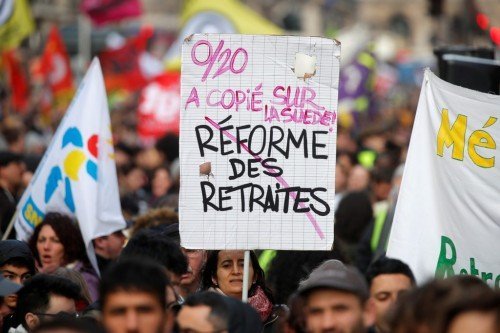
In a historic move, France's eight main labor unions are joining forces for the first time in over ten years to demonstrate against government policies. Together they will form an unprecedented union front bringing together workers from all walks of life and advocating for fundamental change with their shared voice.
"The government is making itself look good in the eyes of the public by saying that it has negotiated with the trade unions, but the exchanges we have had have only resulted in measures to make things look good."
Staunch opposition
After years of political stagnation, the government has decided to raise its citizens' retirement age despite overwhelming public opposition. The seemingly ill-timed measure comes as many already struggle with skyrocketing prices and wages that fail to keep up.
"I'm well aware that changing our pension system raises questions and fears among the French," Borne said on Tuesday, adding that her government would work on convincing the French that the reform was necessary.
"We offer today a project to balance our pension system, a project that is fair," she said.
- French PM Borne unveils revamp of pension payments
Overhauling the pension system was a central pillar of Macron's reformist agenda when he entered the Élysée Palace in 2017. But he shelved his first attempt in 2020 as the government battled to contain the Covid outbreak.
CGT leader Philippe Martinez said unions were “determined” the pensions bill would not make it through the National Assembly, while CFDT head Laurent Berger denounced "one of the most brutal pension reforms of the last 30 years".
Appeal to private sector
No target figures have been officially set by the unions for the upcoming day of action, but it is agreed that participation will need to be higher than in December 2019, when 806,000 people took to the streets, according to conservative Interior Ministry figures.
The unions are hoping that all professional sectors will join the strike and that anger over inflation and the energy crisis will fuel support for street protests.
While workers who stand to lose favourable retirement privileges - teachers, electricians, gas workers, metro and rail workers - are expected to cause the most disruption, unions are also targeting the private sector, which is typically less quick to mobilise.
- Macron's reputation on the line as government unveils pension reform
“Whole sectors of the economy need block production because this is what will get the attention of employers and the government", said CGT boss Catherine Perret.
"We have worked a lot with certain sectors, such as the food industry or trade, to defend their wages."
France Inter said it had seen a note from intelligence services indicated that grassroots “yellow vests" protesters could also join the street rallies.
Parliamentary challenge
For the pensions reform to become law, it will need to be adopted in parliament, where President Emmanuel Macron’s Renaissance party does not have an absolute majority.
The government has already made some concessions to the conservative Les Républicains party, which is itself not united on the issue - so every vote will count.
The Socialists, the hard-left France Unbowed party and the far-right's National Rally have all said they will oppose the reform.








